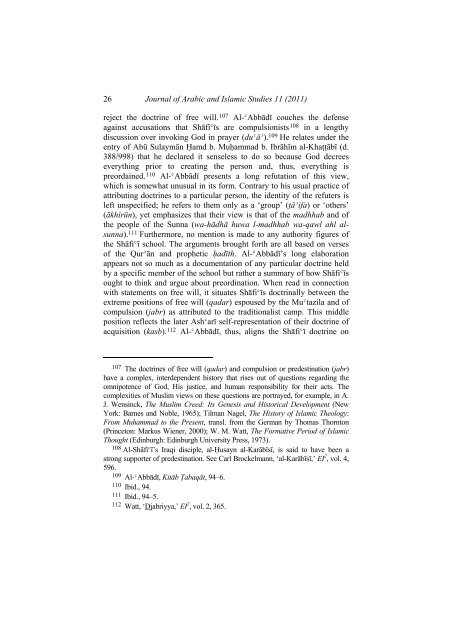JOURNAL OF ARABIC AND ISLAMIC STUDIES
JOURNAL OF ARABIC AND ISLAMIC STUDIES
JOURNAL OF ARABIC AND ISLAMIC STUDIES
You also want an ePaper? Increase the reach of your titles
YUMPU automatically turns print PDFs into web optimized ePapers that Google loves.
26<br />
Journal of Arabic and Islamic Studies 11 (2011)<br />
reject the doctrine of free will. 107 Al-ʿAbbādī couches the defense<br />
against accusations that Shāfiʿīs are compulsionists 108 in a lengthy<br />
discussion over invoking God in prayer (duʿāʾ). 109 He relates under the<br />
entry of Abū Sulaymān Ḥamd b. Muḥammad b. Ibrāhīm al-Khaṭṭābī (d.<br />
388/998) that he declared it senseless to do so because God decrees<br />
everything prior to creating the person and, thus, everything is<br />
preordained. 110 Al-ʿAbbādī presents a long refutation of this view,<br />
which is somewhat unusual in its form. Contrary to his usual practice of<br />
attributing doctrines to a particular person, the identity of the refuters is<br />
left unspecified; he refers to them only as a ‘group’ (ṭāʾifa) or ‘others’<br />
(ākhirūn), yet emphasizes that their view is that of the madhhab and of<br />
the people of the Sunna (wa-hādhā huwa l-madhhab wa-qawl ahl alsunna).<br />
111 Furthermore, no mention is made to any authority figures of<br />
the Shāfiʿī school. The arguments brought forth are all based on verses<br />
of the Qurʾān and prophetic ḥadīth. Al-ʿAbbādī’s long elaboration<br />
appears not so much as a documentation of any particular doctrine held<br />
by a specific member of the school but rather a summary of how Shāfiʿīs<br />
ought to think and argue about preordination. When read in connection<br />
with statements on free will, it situates Shāfiʿīs doctrinally between the<br />
extreme positions of free will (qadar) espoused by the Muʿtazila and of<br />
compulsion (jabr) as attributed to the traditionalist camp. This middle<br />
position reflects the later Ashʿarī self-representation of their doctrine of<br />
acquisition (kasb). 112 Al-ʿAbbādī, thus, aligns the Shāfiʿī doctrine on<br />
107 The doctrines of free will (qadar) and compulsion or predestination (jabr)<br />
have a complex, interdependent history that rises out of questions regarding the<br />
omnipotence of God, His justice, and human responsibility for their acts. The<br />
complexities of Muslim views on these questions are portrayed, for example, in A.<br />
J. Wensinck, The Muslim Creed: Its Genesis and Historical Development (New<br />
York: Barnes and Noble, 1965); Tilman Nagel, The History of Islamic Theology:<br />
From Muhammad to the Present, transl. from the German by Thomas Thornton<br />
(Princeton: Markus Wiener, 2000); W. M. Watt, The Formative Period of Islamic<br />
Thought (Edinburgh: Edinburgh University Press, 1973).<br />
108 Al-Shāfiʿī’s Iraqi disciple, al-Ḥusayn al-Karābīsī, is said to have been a<br />
strong supporter of predestination. See Carl Brockelmann, ‘al-Karābīsī,’ EI 2 , vol. 4,<br />
596.<br />
109 Al-ʿAbbādī, Kitāb Ṭabaqāt, 94–6.<br />
110 Ibid., 94.<br />
111 Ibid., 94–5.<br />
112 Watt, ‘Djabriyya,’ EI 2 , vol. 2, 365.

















